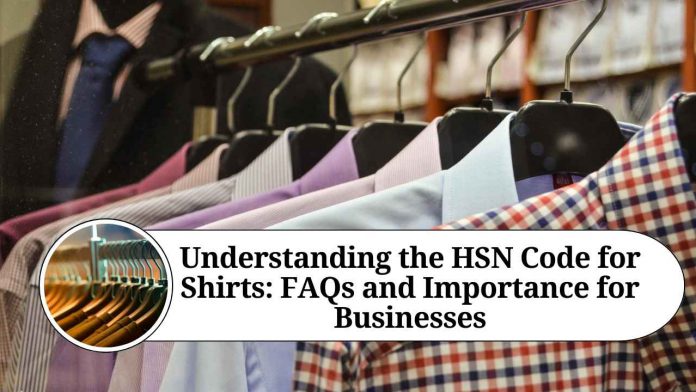If you are involved in the business of selling shirts, it is important to have a clear understanding of the HSN code system in order to correctly classify your products for taxation purposes. HSN stands for Harmonized System of Nomenclature, which is a globally recognized system for classifying goods in international trade.
The HSN code for shirts is 61, which falls under the heading of “Articles of apparel and clothing accessories, knitted or crocheted”. The sub-heading for shirts is 6105, which specifically refers to “Men’s or boys’ shirts, knitted or crocheted”.
It is important to note that the HSN code for shirts may vary depending on certain factors such as the material used, the style of the shirt, and its intended use. For example, if the shirt is made from woven fabric rather than knitted or crocheted fabric, it would fall under a different HSN code.
HSN codes are used for a variety of purposes, but their primary purpose is for taxation. When you sell a shirt, you must charge the appropriate Goods and Services Tax (GST) based on the HSN code. The GST rates vary depending on the HSN code, so it is important to classify your shirts correctly in order to charge the correct GST rate.
To find the HSN code for your specific type of shirt, you can refer to the HSN code list provided by the government or consult with a tax expert. It is important to ensure that you are using the correct HSN code to avoid any potential tax penalties or legal issues.
In India, the HSN code system was introduced as part of the Goods and Services Tax (GST) implementation in 2017. The GST is a comprehensive indirect tax that replaced multiple indirect taxes, such as Central Excise Duty, Service Tax, and Value Added Tax (VAT). The HSN code system plays a crucial role in the GST as it helps to determine the GST rates applicable to different goods and services.
The HSN code for shirts is important for both manufacturers and retailers. Manufacturers need to ensure that they classify their products correctly so that they can avail of the correct tax benefits and comply with regulatory requirements. Retailers need to use the correct HSN code when invoicing customers to ensure that they are charging the correct GST rates.
It is important to note that the HSN code system is not static and may change from time to time. Therefore, businesses must keep themselves updated on any changes to the HSN code list and ensure that they are using the latest version.
In addition to the HSN code, businesses must also comply with other regulatory requirements related to the sale of shirts. For example, they must comply with labeling requirements, such as providing information on the country of origin, fiber content, and care instructions. Failure to comply with these requirements can result in legal and financial penalties.
Conclusion
In conclusion, the HSN code for shirts is an important aspect of the GST system in India. Businesses involved in the sale of shirts must ensure that they classify their products correctly and comply with other regulatory requirements related to the sale of apparel. By doing so, they can avoid legal and financial penalties and ensure that their business operations are smooth and hassle-free.
Other Related Blogs: Section 144B Income Tax Act
Frequently Asked Questions (FAQs)
Q: What is an HSN code? A: HSN code stands for Harmonized System of Nomenclature. It is a globally recognized system for the classification of goods in international trade.
Q: What is the HSN code for shirts? A: The HSN code for shirts is 61. The sub-heading for shirts is 6105, which specifically refers to “Men’s or boys’ shirts, knitted or crocheted”.
Q: Why is the HSN code important for businesses selling shirts? A: The HSN code is important for businesses selling shirts as it helps to classify the products correctly for taxation purposes. By using the correct HSN code, businesses can ensure that they are charging the correct GST rate and avoid any potential legal issues.
Q: Do different types of shirts have different HSN codes? A: Yes, different types of shirts may have different HSN codes depending on factors such as the material used, the style of the shirt, and its intended use. For example, a shirt made from woven fabric may fall under a different HSN code than a shirt made from knitted or crocheted fabric.
Q: Can the HSN code for shirts change? A: Yes, the HSN code list is not static and may change from time to time. Businesses must keep themselves updated on any changes to the HSN code list and ensure that they are using the latest version.
Q: Are there any labeling requirements that businesses must comply with when selling shirts? A: Yes, businesses must comply with labeling requirements related to the sale of shirts. This includes providing information on the country of origin, fiber content, and care instructions. Failure to comply with these requirements can result in legal and financial penalties.
Q: Where can I find the HSN code list for shirts? A: The HSN code list for shirts can be found on the government website or by consulting with a tax expert.




















